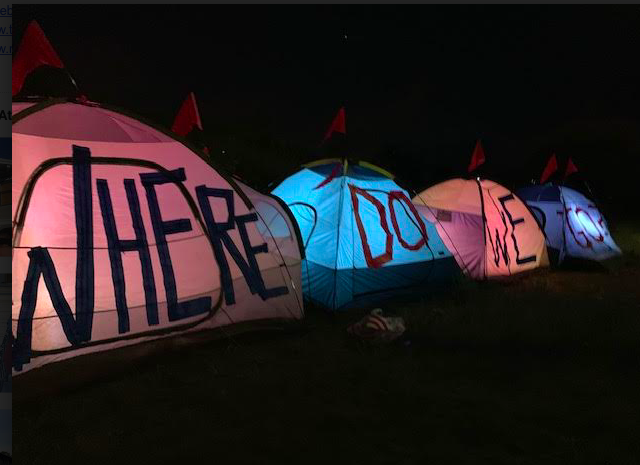The US Supreme Court will hear arguments Tuesday/22 on a case that could have massive implications for how San Francisco deals with homeless people.
The high court will consider whether to overturn the Grants Pass decision by the 9th Circuit Court of Appeals, which held that cities can’t criminalize the unhoused (by, among other things, sweeping encampments) if there’s no place else to people to go.
San Francisco has joined other cities in filing briefs seeking to overturn the decision—and allow the brutal, sometimes deadly, sweeps to go on without limit.

That is: The Court could rule that cities can steal people’s possessions, force them into the rain and cold, and seek to drive them out of town for the crime of not being able to afford a place to live.
A broad coalition of activist groups is planning nationwide demonstrations, starting in San Francisco at the Federal Building at 10am. Among those involved at the Coalition on Homelessness, POOR Magazine, the Anti Police Terror Project, and the Western Regional Advocacy Project.
Info: wrap@wraphome.org
So the San Francisco Zoo is supposed to be getting some pandas, and Mayor London Breed is taking full credit. This may (or may not) help her struggling re-election campaign.
But I can say this much: The current Zoo, with its current management, is in no way prepared to accept, manage, and take care of the precious Chinese visitors.
This is zoo (run by the private Zoological Society) that allowed a tiger to escape its cage and kill someone. It’s the zoo that was fined by the feds for allowing a door to crush a baby gorill. It’s the short-staffed zoo where a grizzly bear nearly got to a zookeeper just last week.
Public records show that the Zoological Society loses millions of dollars every year, and the city has to put up about $4 million to keep it afloat. The cost of a new Panda enclosure: At least $25 million
The source for that money? At this point, there isn’t one.
From the Chron:
Travis Shields, who was a zookeeper and assistant curator at the San Francisco Zoo until last year, said he does not know how the zoo can afford to bring in pandas when it faces difficulties maintaining its existing facilities and building new ones. For example, the zoo broke ground on an ambitious new Madagascar Center in 2018 that finally opened to the public last year but is not complete. “Honestly, I don’t know where that money would come from, because they struggle now to build new exhibits and complete them,” Shields said.
And imagine the international incident if something bad happened to the pandas at the San Francisco Zoo.
The Planning Commission Thursday/25 will hear a report from the agency that coordinates spending on infrastucture projects in the areas that have specific neighborhood plans. (That’s Balboa Park, Rincon Hill, Transit Center, Vis Valley, Soma, the Eastern Neighborhoods, and Market/Octavia.)
The concept: The plans allow for new development, and the developers pay fees into a fund that covers the cost of the road improvements, transit, parks, water and sewer, child-care centers, and other impacts that the new development creates. Fair enough—although typically the fees are nowhere near enough to cover the actual impacts, so the taxpayers have to cough up the rest.
But it gets worse. Because nobody is building much right now, thanks to economic issues that have nothing to do with city zoning rules, not that much money is coming in. Then the mayor and the supes agreed, in an effort to spur development, to defer all of the fees until after the project is complete. As a result:
Because of the slowing of revenue, and the now anticipated delay and reduction of fee revenue moving forward, IPIC is recommending that no new projects be appropriated for the next two years. Instead, IPIC will look to prioritize funding projects for which previous commitments have been made.
That’s right: No new transit, or parks, or street upgrades, or anything else in any of those neighborhoods until 2026 (at the earliest).
The impacts don’t go away. The money just does.
This could be a model for the new normal: The developers at Treasure Island want a $115 million bailout because their projects aren’t making enough money. And at the Budget and Finance Committee hearing on the issue, Sup. Rafael Mandelman made a remarkable statement. I’m not sure anyone else noticed, but it was a pretty big deal.
He said that since the passage of Prop. 13, which limited the ability of local government to bring in from property taxes revenue to cover the costs of growth, cities have found ways to use fees to charge developers for the impacts of their projects.
That, he said, may have to change: “San Francisco has to think—can we really put all these infrastructure costs onto private developers?”
Changing that process—in other words, putting on the backs of the local taxpayers the cost of serving the needs of massive corporations funded with speculative capital—would be one of the most profound changes in city policy I’ve seen in my 43 years covering San Francisco politics.
I sometimes disagree with Tom Radulovich, who runs Livable City, but he is an urbanist, and he has often told me that “growth should pay for growth.”
If San Francisco is about to give up on that, we could be in a world of financial trouble.





